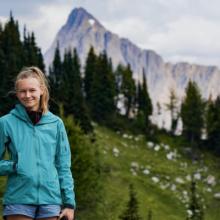Grace Melchers
Why did you decide to pursue a graduate degree?
I decided to pursue graduate school for a combination of reasons. I knew that additional experience and education within my field, ecology and conservation, would help me in pursuing a career in that realm by improving my skills and knowledge. I am also a naturally curious person and avid learner, so graduate school sounded exciting and fulfilling!
Why did you decide to study at UBC?
I studied at UBC during my undergraduate degree in the Faculty of Forestry and had an incredible experience. UBC Vancouver enticed me from Ontario for my first degree due to it's excellent reputation and proximity to world-class skiing and hiking. For my second degree, the same is true, but now I also have a fabulous community and support system here, particularly within my current department.
What is it specifically, that your program offers, that attracted you?
The Master's of Science in Oceans and Fisheries predominantly attracted me due to the caliber of research being conducted within the program and the independence afforded to its students. The ability to choose a thesis project, develop it and carry it out on my own was a major draw, and I knew I would learn so much from this process. I am also very passionate about ocean ecosystems and their connection to the land, which this program is specifically designed to explore.
What was the best surprise about UBC or life in Vancouver?
Despite already knowing UBC through my undergraduate experience, I was incredibly impressed and surprised by the availability of support UBC has given me in a variety of dimensions. From research funding and consultation to safety planning, there are always people to reach out to who are responsive and friendly.
What aspect of your graduate program do you enjoy the most or are looking forward to with the greatest curiosity?
Thus far into my graduate program, there are two components I have enjoyed the most. The first has been the community of students, researchers and colleagues I have had the pleasure of meeting and working with. Everyone has been incredibly supportive and kind and will never hesitate to look over my work or sit and have lunch together. The second would have to be the freedom and flexibility my supervisor has given me with my project. It has allowed me to explore different avenues of research and feels empowering to be trusted with the responsibility of managing a research project.
What do you see as your biggest challenge(s) in your future career?
I think some of the major challenges as I pursue a career in ecology and conservation will pertain to the dual impacts of climate change and governmental shifts. Climate change is posing some of the biggest threats to all aspects of the environment, with my study subjects being no exception. With that can come greater opportunities but more difficult problems to solve. And career stability in the realm of science is also often at the mercy of changing governmental values. The next few years in these realms will shape the future of my career in this field.
How do you feel your program is preparing you for those challenges?
My program is providing me with a variety of skills that I can apply to many different types of jobs, which I believe will provide some stability throughout the climate and governmental shifts we are facing. Being adaptable is something you learn through practice, and this is something I've had to do often within my program thus far — changing courses, changing research directions and much more. Apart from giving me the skills to succeed in my field, this program gives me the hard and soft skills needed to succeed in any higher-level job, which is reassuring.
What aspects of your life or career before now have best prepared you for your UBC graduate program?
I think my passion for our natural world and the relationships we as humans have to it has really propelled and prepared me for grad school. When deciding to go to grad school, I knew I should only be pursuing it if I was studying something I was passionate about. Otherwise, I think it would have been a difficult slog to complete. My field of research is exciting and impactful to me, and that has motivated me to deal with the challenges associated with graduate school. My undergraduate degree program and the mentors I had within it also prepared me very well for my graduate program.
What do you like to do for fun or relaxation?
I have many hobbies — too many hobbies! When I'm not working, I try to focus my time on recreating outdoors, be it through skiing, biking, hiking or kayaking as a way to connect with nature and friends. Otherwise, you can find me crafting, reading a good book or listening to music!
What advice do you have for new graduate students?
For myself and many others I've talked to, grad school seems like a bit of a mystery a lot of the time, especially when you are starting out. There is no complete handbook to graduate school, and everyone experiences it differently. Make sure to ask a lot of questions and seek out opportunities that allow you to tailor your graduate school experience to achieve your goals. There are so many opportunities available in addition to your thesis and coursework that it can be overwhelming sometimes! Don't feel like you need to do everything, but adding in extracurriculars and other experiences are what makes your grad school experience fulfilling.




